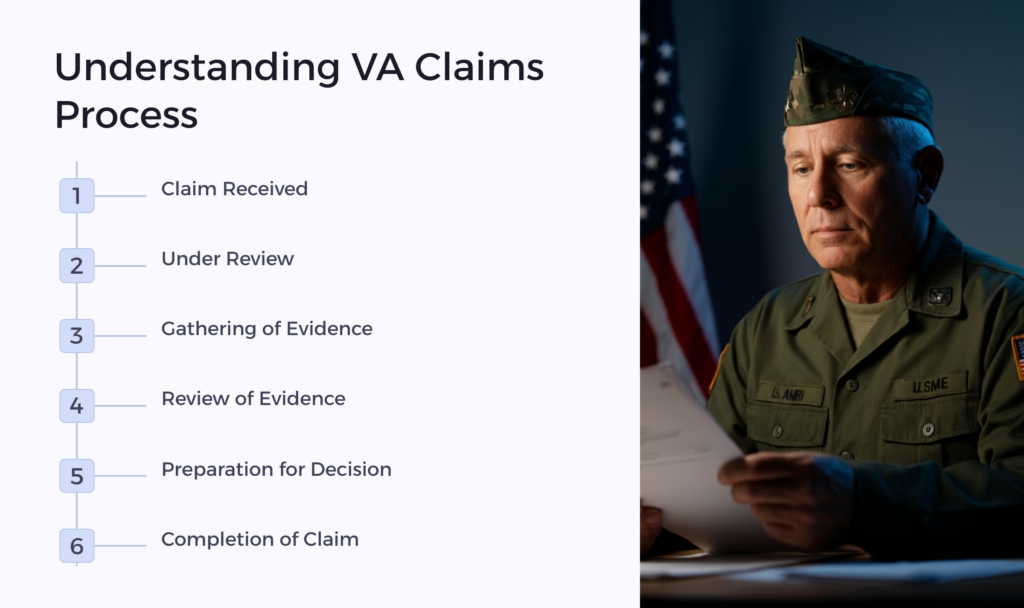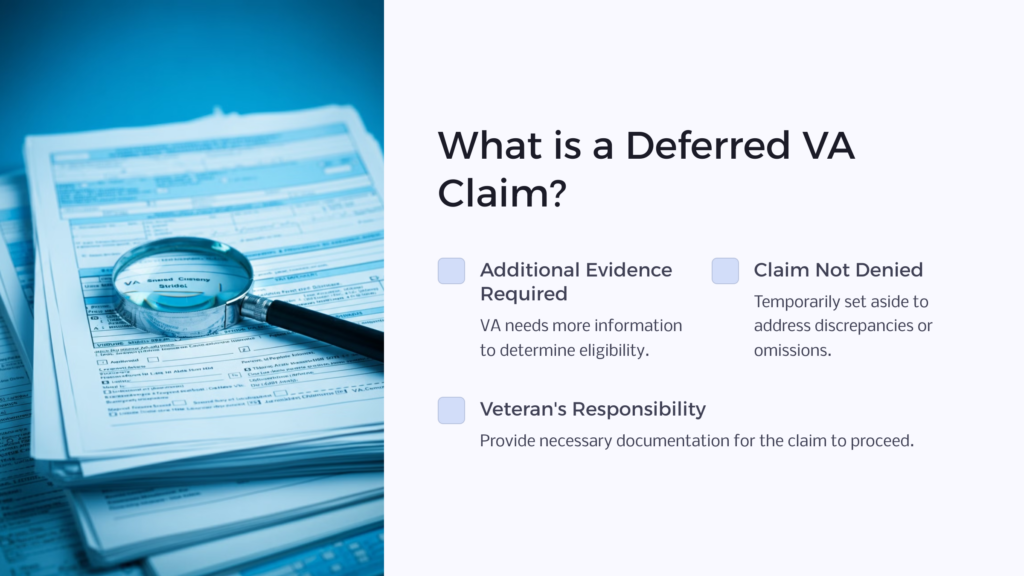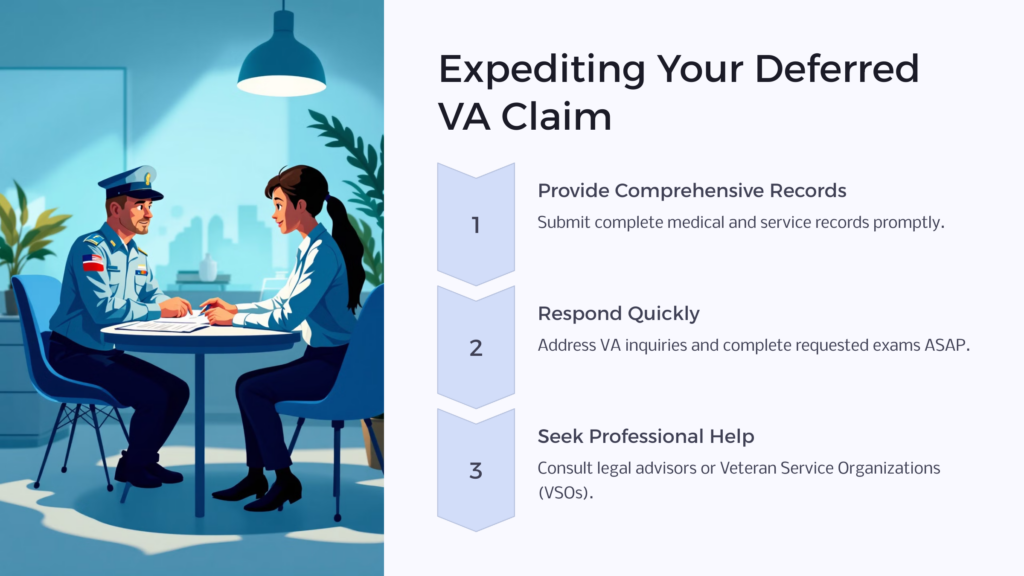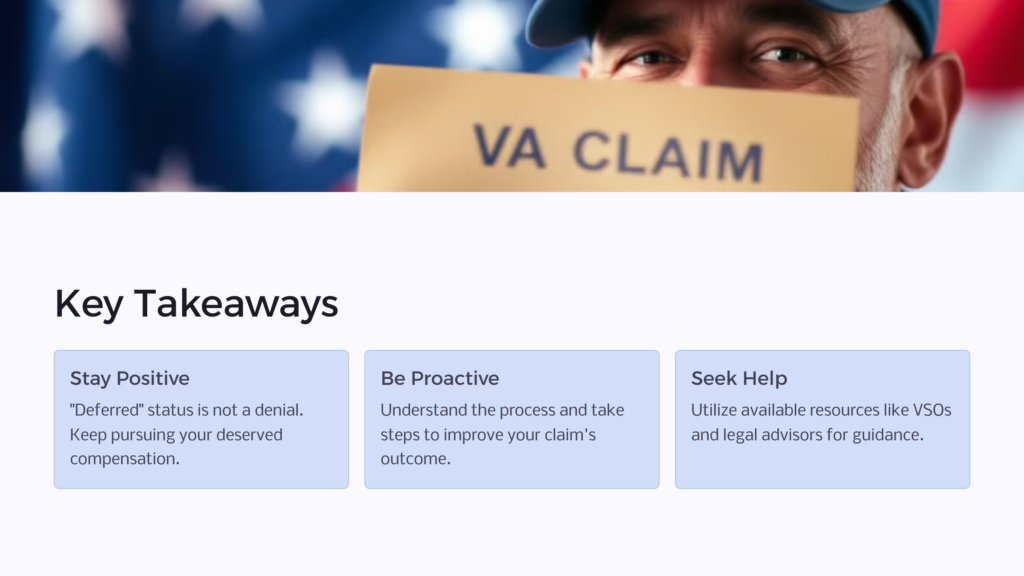Every year, countless veterans submit claims to the United States Department of Veterans Affairs (VA), but not all of these claims are processed immediately. Some are put on hold, or “deferred,” for a variety of reasons. This article will explain the VA disability claim in detail, what a deferred VA claim means, the factors affecting the processing time of a deferred decision, and how to potentially expedite your rating and therefore your VA disability compensation. This information is crucial for veterans as it allows them to better understand the process and work more effectively within the system.
Understanding VA Claims

The VA claims process is designed to support veterans by providing them with the benefits they earned through their services. Generally, this process begins when a veteran files a claim for benefits. The VA then gathers evidence, reviews the provided information, verifies the validity of the claim, and then makes a decision regarding eligibility for VA disability benefits.
The stages of this process are:
- Claim Received
- Under Review
- Gathering of Evidence
- Review of Evidence
- Preparation for Decision
- Completion of Claim.
They are all meticulously designed to allow for thorough vetting, ensuring validity and accuracy in each disability claim.
The Meaning of Deferred Status in VA Claims

A deferred claim means the VA requires additional evidence to determine eligibility. When a claim is deferred, it means the VA requires more information before a rating decision can be made. The claim is not denied; rather, it is temporarily set aside to address any discrepancies or omissions in the claim.
The circumstances that might lead to a deferred claim include insufficient medical records, the need for additional service documents to verify a condition’s service connection, or the lack of necessary paperwork to support the claim. In these instances, it’s the veteran’s responsibility to provide the necessary documentation for the claim to proceed.
Factors Affecting the Duration of a Deferred VA Claim
Various factors influence the duration of the deferred process. Firstly, an existing backlog of cases at a VA office can significantly impact how quickly a claim is resolved. Additionally, the VA respects the right of every veteran to thorough, deliberate consideration, which unfortunately may result in a delay when dealing with a high volume of claims.
Secondly, the complexity and the nature of the claim play crucial roles. More complex claims necessitate a more meticulous review process which prolongs the duration. Lastly, the availability and completeness of the necessary documentation significantly affect the timeline. If a veteran can provide all requested documentation promptly, the VA can make a decision faster, and send you your allotted veterans benefits.
Typical Duration of a Deferred VA Claim
The VA aims to complete deferred claims within 125 days; however, this target isn’t always met. The waiting period can extend to several months, or in some complicated cases, even years. This duration is longer when compared with other claim statuses due to the additional evidence required and the time it generally takes to gather and review this material.
Steps to Expedite Your Deferred VA Claim

To speed up the process of a deferred VA claim, veterans can take several steps. By providing comprehensive medical and service records promptly, the VA will potentially process the claim quicker. It’s also helpful to actively respond to VA inquiries and complete any requested exams or assessments as soon as possible.
Moreover, veterans could seek professional help. Legal advisors and Veteran Service Organizations (VSOs) have extensive knowledge about the VA process and can help to streamline it, ensuring that all necessary documentation is provided and that the claim is presented in the most compelling manner possible.
Impact of COVID-19 on Deferred VA Claims
The COVID-19 pandemic has significantly impacted deferred VA claims, leading to an increase in claim backlog due to safety measures and remote working adjustments. Despite these challenges, the VA has been implementing new strategies to manage claims more effectively.
Some of these adaptations include leveraging technology to facilitate remote working and introducing innovative ways to collect crucial documents virtually, rather than through traditional mail-enhancing efficiency and reducing the risk of virus transmission.
Navigating a deferred rating decision can be a challenging process for veterans. Nevertheless, it’s essential to note that a “deferred” status is not a denial and should not discourage veterans from pursuing their deserved disability compensation.
While the process might sometimes be lengthy, understanding the influencing factors and the necessary steps can significantly improve your claim’s outcome. Ensure that your documentation is solid and consider seeking expert advice to navigate the challenges that may emerge.
If you are a veteran dealing with a deferred VA claim, don’t hesitate to seek out and utilize available resources. Legal advisors, Veteran Service Organizations (VSOs), and even fellow veterans can provide valuable advice, making your journey to securing benefits less arduous. Remember, you’re not alone — help is available, and you deserve to reap the rewards of your service.

 Benefits.com Advisors
Benefits.com Advisors
With expertise spanning local, state, and federal benefit programs, our team is dedicated to guiding individuals towards the perfect program tailored to their unique circumstances.
Rise to the top with Peak Benefits!
Join our Peak Benefits Newsletter for the latest news, resources, and offers on all things government benefits.



















